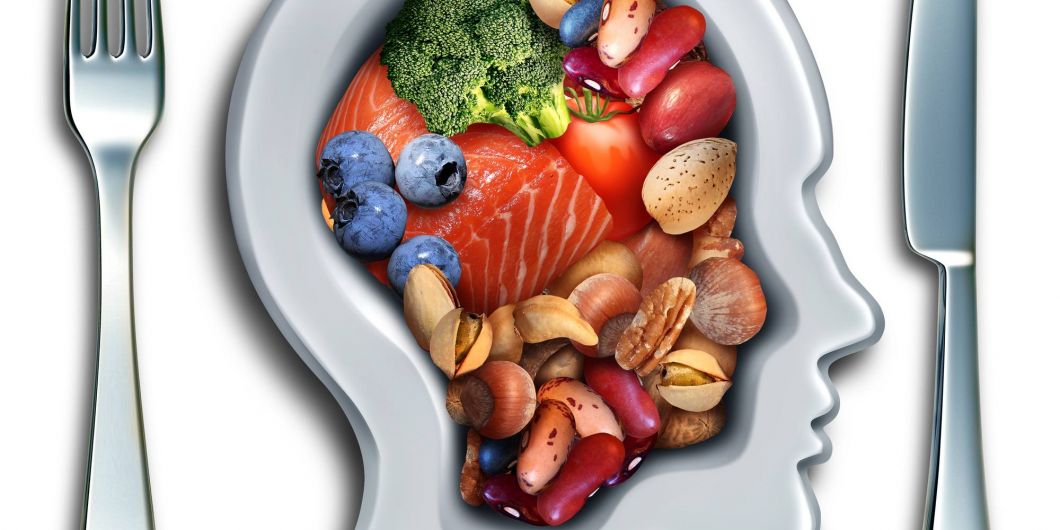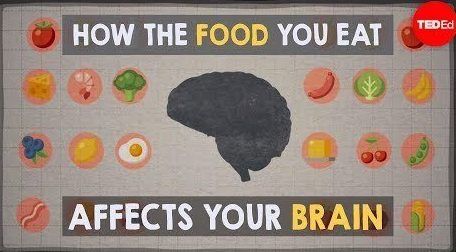- in Mental Health by Tony
How the food you eat affects your brain – Brain food

Juliette Kellow and Dr Sarah Brewer take a look at some of the best foods to eat for brain health. We can't reverse all the brain changes that come with getting older. But as we find out about how ageing affects the brain, research offers up new food solutions to slow cognitive decline, boost mood, improve memory, and protect against dementia and stroke.
More...
As we age...
Our life's experiences continue to shape our brains alongside a sequence of physical and chemical changes. Discover how what you eat can help redress the balance of age-related changes.
New brain cells are made
An adult brain has about 100 billion nerve cells - or neurons. As we get older, these numbers decrease, and this decline tends to start in our 20s. But it's reassuring to know that certain parts of our brain continue to create new neurons via the process of neurogenesis.
The hippocampus (a part of the brain that's key in learning and memory formation) is one such centre. And by the age of 50, all the neurons in the hippocampus we were born with will have been replaced by new ones.
Research shows that we can influence neurogenesis via our lifestyle (via physical activity and dealing with stress) as well as through what we eat (with berries being heralded for their neurogenetic benefits).
The brain shrinks
The brain is super organised: the cell bodies of neurons occupy its grey matter, while its white matter is home to the connecting fibres between neurons.
From young adulthood the brain's white matter is diminishing - about 15 per cent across a lifetime - and this white matter plays an important role in mood, walking, and balance. Information processing, thinking, and memory are functions that reside within the grey matter.
The volume of grey matter also diminishes with age, but it's not until significant reductions are seen that cognitive decline and dementia arise. Foods can counteract age-related reductions in cognitive powers.
Sleep patterns can change
The body's master clock, which sits in the brain's hypothalamus, controls the production of various hormones, including those that influence sleep - melatonin and serotonin. The rhythm of changing levels of these hormones gives us our sleep/wake cycle.
Many people believe that as you get older you need less sleep, but this isn't true: adults continue to need about 7-9 hours' sleep a night.
Many healthy older adults report few sleep problems, but some experience a shift in their cycles that causes them to wake up in the early hours of the morning.
If your sleep patterns are changing, then take a look at what you're eating to see how it can make a difference.
The brain receives a soup of chemicals via the bloodstream that enable it to function. Here are some foods which provide key brain-healthy nutrients.
Berries
A review of studies published in 2017 found that eating anthocyanin-rich foods improves verbal learning and memory. Previous studies have shown that eating two servings of berries a week can slow down age-related cognitive decline. All red and blue berries contain anthocyanins - they're responsible for their colour.
Tea and coffee
Research links a higher intake of caffeine (present in tea and coffee) to a lower risk of dementia. One study found that women with high caffeine intakes had less cognitive decline over four years than those consuming low amounts.
Leafy greens
Folate is a B vitamin that's vital for brain function and emotional wellbeing. A study found a supplement of folate reduced brain shrinkage in adults at risk of dementia. Spinach, brussels sprouts, and kale top the folate list.
Curry powder
Turmeric is often singled out for its potential protection against dementia via the chemical curcumin. But curry powder (with extra chilli, ginger, coriander, cumin, and pepper) may offer even more brain function benefits.
Fish
One of the omega-3 fats found naturally in fish - DHA – is vital for brain function throughout life. All fish, including
white fish and shellfish, contain this omega-3 fat but oily fish are the richest source, with mackerel ranking top.
Foods to avoid
Evidence suggests risk factors for Alzheimer's disease and dementia are similar to those for heart disease, so a heart-friendly diet that limits salt and saturated and trans fats is also brain-friendly.
Salt - High salt intake increases the risk of high blood pressure, which in turn increases the risk of having a stroke. Don't add salt during cooking or to meals, limit processed foods, and choose lower-salt options wherever possible.
"Bad" fats - Several, although not all studies, indicate negative relationships between saturate and trans-fat intake and risk of cognitive problems. One study showed high intakes of saturates (26g a day) were linked to double the risk of developing Alzheimer's disease as those eating 13g a day.

Your Brain on Food If you sucked all of the moisture out of your brain and broke it down to its constituent nutritional content, what would it look like?
Most of the weight of your dehydrated brain would come from fats, also known as lipids. In the remaining brain matter, you would find proteins and amino acids, traces of micronutrients, and glucose.
The brain is, of course, more than just the sum of its nutritional parts, but each component does have a distinct impact on functioning, development, mood, and energy. So that post-lunch apathy, or late-night alertness you might be feeling, well, that could simply be the effects of food on your brain.
Of the fats in your brain, the superstars are omegas 3 and 6. These essential fatty acids, which have been linked to preventing degenerative brain conditions, must come from our diets. So eating omega-rich foods, like nuts, seeds, and fatty fish, is crucial to the creation and maintenance of cell membranes.
While omegas are good fats for your brain, long-term consumption of other fats, like trans and saturated fats, may compromise brain health.
Meanwhile, proteins and amino acids, the building block nutrients of growth and development, manipulate how we feel and behave.
Amino acids contain the precursors to neurotransmitters, the chemical messengers that carry signals between neurons, affecting things like mood, sleep, attentiveness, and weight.
They’re one of the reasons we might feel calm after eating a large plate of pasta or more alert after a protein-rich meal.
The complex combinations of compounds in food can stimulate brain cells to release mood-altering norepinephrine, dopamine, and serotonin.
But getting to your brain cells is tricky, and amino acids have to compete for limited access.
A diet with a range of foods helps maintain a balanced combination of brain messengers and keeps your mood from getting skewed in one direction or the other.
Like the other organs in our bodies, our brains also benefit from a steady supply of micronutrients.
Antioxidants in fruits and vegetables strengthen the brain to fight off free radicals that destroy brain cells, enabling your brain to work well for a longer period of time.
Without powerful micronutrients, like the vitamins B6, B12, and folic acid, our brains would be susceptible to brain disease and mental decline.
Trace amounts of minerals iron, copper, zinc, and sodium are also fundamental to brain health and early cognitive development.
In order for the brain to efficiently transform and synthesize these valuable nutrients, it needs fuel and lots of it.
While the human brain only makes up about 2% of our body weight, it uses up to 20% of our energy resources.
Most of this energy comes from carbohydrates that our body digests into glucose or blood sugar.
The frontal lobes are so sensitive to drops in glucose, in fact, that a change in mental function is one of the primary signals of nutrient deficiency. Assuming that we are getting glucose regularly, how does the specific type of carbohydrates we eat affect our brains?
Carbs come in three forms: starch, sugar, and fiber. While on most nutrition labels, they are all lumped into one total carb count, the ratio of the sugar and fiber subgroups to the whole amount affect how the body and brain respond.
A high glycemic food, like white bread, causes a rapid release of glucose into the blood and then comes the dip.
Blood sugar shoots down, and with it, our attention span and mood.
On the other hand, oats, grains, and legumes have slower glucose release, enabling a steadier level of attentiveness.
For sustained brain power, opting for a varied diet of nutrient-rich foods is critical.
When it comes to what you bite, chew, and swallow, your choices have a direct and long-lasting effect on the most powerful organ in your body.